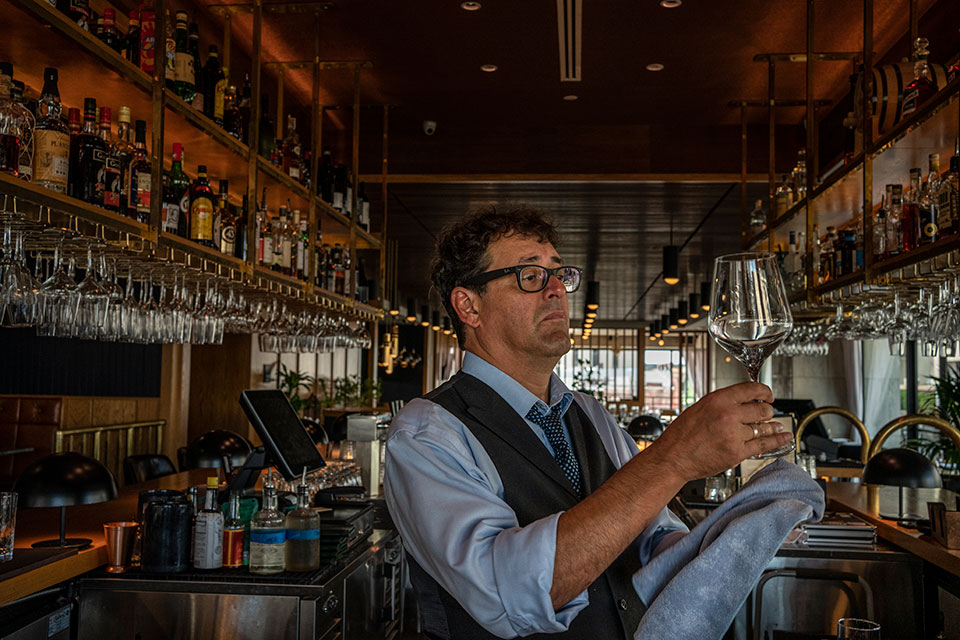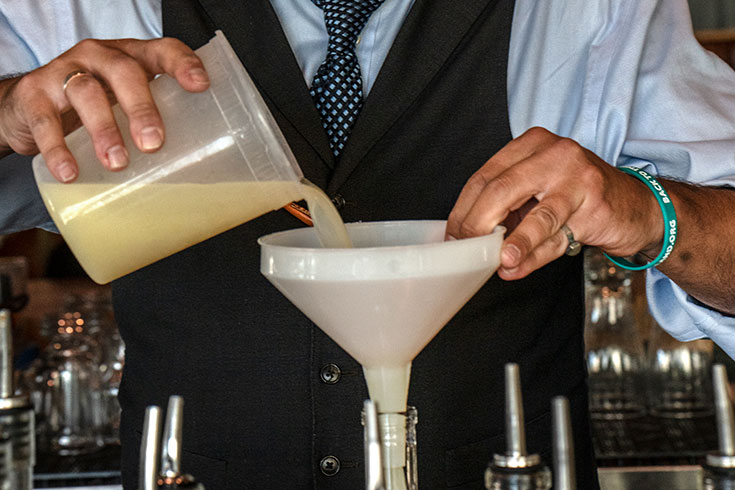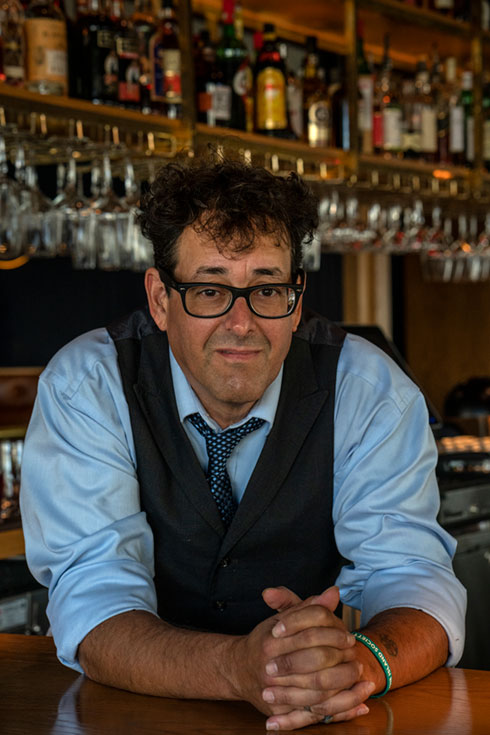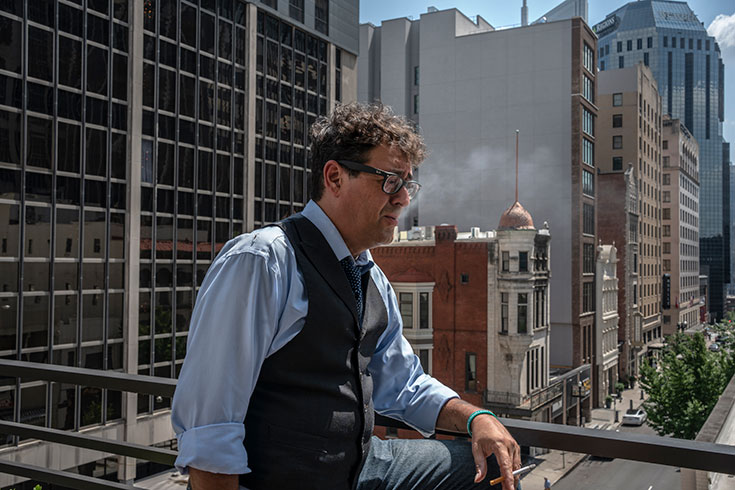Ricardo: It’s a roller coaster ride

Ricardo is a Latinx man in his early 50s who has worked as a bartender for most of his adult life. Born and raised in Puerto Rico, he and his partner both work in the restaurant industry in Nashville, Tennessee.
Photo Credit: John Partipilo (all photos)
Ricardo speaks with pride about his work as a bartender and the skills and knowledge that he has accumulated from working in the restaurant industry for thirty-five years. Born in Puerto Rico and fluent in both Spanish and English, he describes himself as a “white presenting Latino.” He has worked in over thirty restaurants and bars in many cities, from Atlanta, Georgia to New Orleans, to name just a few. He knows many people in the business and is widely respected as an industry veteran. An extrovert who loves talking with people, Ricardo thrives on interacting with customers and making sure that they enjoy themselves. He is good at juggling multiple tasks and managing busy times when there are a lot of customers and demands on the server staff. In fact, he relishes the challenge of bringing order to chaos, and takes pride in his ability to always provide the best service to customers, even under the most hectic conditions.
 Even though Ricardo loves some aspects of his profession, he is adamant that he does not want his son, a twenty-one-year old in college, to follow in his footsteps: “I'd sell my soul to make sure that my kid never worked in a restaurant.” He worries about the instability. Restaurants can close down suddenly with no warning, and employees lose their jobs or pay with no notice or explanation. Restaurant staff have few practical ways to protect themselves if their employer treats them unfairly. Sure, there are laws against discrimination and harassment. But how many workers have the time and money to file lawsuits against their employer and then risk getting a reputation in the industry so that no one else wants to hire you? In an industry where everything is constantly in flux, it is easier to just pick up and move on to another job.
Even though Ricardo loves some aspects of his profession, he is adamant that he does not want his son, a twenty-one-year old in college, to follow in his footsteps: “I'd sell my soul to make sure that my kid never worked in a restaurant.” He worries about the instability. Restaurants can close down suddenly with no warning, and employees lose their jobs or pay with no notice or explanation. Restaurant staff have few practical ways to protect themselves if their employer treats them unfairly. Sure, there are laws against discrimination and harassment. But how many workers have the time and money to file lawsuits against their employer and then risk getting a reputation in the industry so that no one else wants to hire you? In an industry where everything is constantly in flux, it is easier to just pick up and move on to another job.
Ricardo describes restaurant service work as a lifestyle and not just a job. He and his friends jokingly refer to those who do not work in the industry as “civilians.” “We say to each other, ‘Oh, you're dating a civilian? How is that working? They sleep at night? Really? Oh, that's weird.’” The lifestyle of restaurant service work includes long working hours extending through nights, weekends and holidays, which results in a schedule that is at odds with much of the rest of the world. There is also very little flexibility: once you’re signed up for a shift, you have to turn up. Ricardo knows from his own experience of once being married to a “nine-to-fiver” (someone who works from 9 am to 5 pm) that relationships tend to fall apart when there are few opportunities to spend time together. The camaraderie of the staff fills that social void as they work “like family” to create a successful restaurant.
The pay system of the restaurant industry makes it hard to take sick leave or go on vacations. Like other servers, Ricardo’s income comes largely from customer tips and not the minimal hourly base pay. Federal law sets the minimum server wage at $2.13 per hour, recognizing that servers get tips. So, in order to maintain a steady income, Ricardo has to be on the floor tending bar and getting those tips.
Even when servers are very sick, taking a day off could mean losing their job unless they arrange for a shift replacement. In over three decades of bartending, Ricardo has only called in sick once. The reason was a trip to the hospital for a broken nose and ribs when a customer attacked him. Even on the day his father died, Ricardo showed up for his shift to work at the bar. Restaurant workers understand that if scheduled to work, they need to be there; that is non-negotiable. Given all these stresses, it is no wonder that self-destructive behaviors are widespread in the industry. Sadly, Ricardo has seen a lot of alcoholism, drug abuse and suicide among his friends over the years.
 Besides living with the volatility of his profession, Ricardo has endured other stressful events. In 2017, Ricardo and his long-time partner Tracy, a chef, were living and working in Puerto Rico when Hurricane Maria hit. It was the worst natural disaster in recorded history to hit Puerto Rico, killing thousands and leaving inhabitants without food, water, housing and electricity. Seven weeks later, seeing no relief in sight, Ricardo and Tracy left Puerto Rico for Atlanta, arriving there with only their cat, three suitcases of possessions, and a plan to build new lives for themselves.
Besides living with the volatility of his profession, Ricardo has endured other stressful events. In 2017, Ricardo and his long-time partner Tracy, a chef, were living and working in Puerto Rico when Hurricane Maria hit. It was the worst natural disaster in recorded history to hit Puerto Rico, killing thousands and leaving inhabitants without food, water, housing and electricity. Seven weeks later, seeing no relief in sight, Ricardo and Tracy left Puerto Rico for Atlanta, arriving there with only their cat, three suitcases of possessions, and a plan to build new lives for themselves.
Three years later, in 2020, the COVID-19 virus hit the world. The virus’s impact on the restaurant industry was devastating. Millions of restaurant employees were immediately laid off or furloughed and thousands of businesses permanently closed their doors. As seasoned and sought-after industry veterans, Ricardo and Tracy weathered the pandemic relatively well, in contrast to many other workers. They had just moved to Nashville, Tennessee – he as a bartender in a high-end restaurant in a tourist district of the city and she as an executive chef at a large restaurant. Both held onto their jobs, although with reduced hours and periods of furlough during the public lockdowns imposed to limit the spread of the virus. With two paychecks to draw on and no major debt, they have weathered the financial losses caused by the pandemic.
Still, Ricardo worries about the future. So far, he has been able to cope with the crises. But will he be able to continue doing this in the years to come, as he moves through his 50s and 60s? At age 53, his “shelf life” as a bartender is coming to an end: “I don't have 10 years left in me behind the bar. It's not realistic to be a 62-year-old bartender.” The long hours and nights and physically and mentally taxing nature of bartending makes it difficult to do as one ages. In fact, Ricardo has thought a lot over the years about leaving the business. But what could he do instead? “After a while you’re trapped. After you’ve been in the industry for a while, you can’t do anything else. I mean, even if I wanted to leave the business, what am I going to do?” Moving into anything new requires investments of time and money, and at least a temporary drop in income. For example, a popular option for bartenders is to become real estate agents. But this involves a change to a new field with new skills and a slow build-up of customers.
Ricardo has thought about moving up within the industry into a management position at a large restaurant. Another possibility is to become a sales representative for a wine or liquor company, which would make use of the knowledge he has gained over the years as a bartender. He has come close to some of these opportunities over the years, but ultimately nothing has panned out.
 During the pandemic, Ricardo saw friends in the business trying to move out of it. A friend had been general manager for two restaurants that were right next door to each other. He only found out that the owners weren't bringing him back when he received a mass email announcing the new general manager for the restaurant. The owners did not even tell him to his face that they weren't hiring him back after the pandemic shutdown: “He had worked for them for years, managing two restaurants, not one, working 60 hours a week, seven days a week. No overtime. Nobody pats you on the back and says, thanks. And then they decide to go in a different direction without bothering to tell him.”
During the pandemic, Ricardo saw friends in the business trying to move out of it. A friend had been general manager for two restaurants that were right next door to each other. He only found out that the owners weren't bringing him back when he received a mass email announcing the new general manager for the restaurant. The owners did not even tell him to his face that they weren't hiring him back after the pandemic shutdown: “He had worked for them for years, managing two restaurants, not one, working 60 hours a week, seven days a week. No overtime. Nobody pats you on the back and says, thanks. And then they decide to go in a different direction without bothering to tell him.”
For Ricardo, restaurant work is like “a roller coaster ride” that is fast-paced and constantly shifting, exciting and terrifying, exhilarating and demoralizing: “The highs are so good and the lows are so horrible. And no matter how safe we are, we’re always waiting for the other shoe to drop. Because you don't know when you're going to show up to work and find the doors locked. And it happens to us all the time. Your livelihood is not secure; it’s never ever secure.”